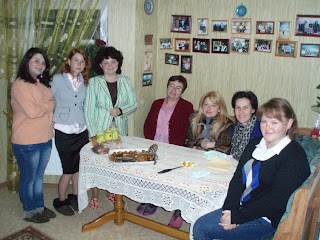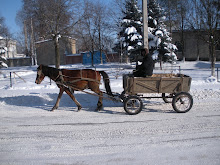
If you want to count how many people actually live in my Moldovan town, then you should bring one of those counting clickers that bus drivers use to the cemetery on Memorial Easter (Paște Blajinilor). I think it is also safe to say that the town taxi service makes a killing on this day since many people chose the two-dollar cab ride over carrying all of their goods to the cemetery. The picture here shows one of the two buses that operated as a shuttle. By goods, I mostly refer to wine, bread, colored eggs, candles, chocolates, candies, and flowers.

Most families also prepare several pomana, like this one. Also, many are offered on a piece of round bread called colac. These are intended to be gifts on behalf of the dead person's soul (a very important Romanian word: suflet). For instance, the Vice Mayor of our town invited me over to the grave of her father, which she had covered with food, flowers, and candles. She told me a little more about her family, then took a pomana from the grave and offered it to me with a glass of wine, saying "from the soul of my father." When taking wine at Easter, we say "Christ is risen," as well as "May God forgive him." After managing the shot of wine (Moldovans do this nice and smooth, but it takes me at least three swallows), I kissed the bread and blew out the candle. People go out and buy extra dishes and mugs to offer the pomana on/in, so I came away from the cemetery a few bowls and one coffee cup richer.

Memorial Easter is the busiest day for the year for our two priests. This picture shows the priests blessing a mountain of food and wine. Some of the food will be left for the altar-boy-equivalents to haul off to the poor and elderly, the rest people will take to their own tables (that they build next to the graves) to eat and share with family. The table is cleared and filled again as if it was never empty in between the blessings. My ignorance might come into play a little here, but I think the job of an Orthodox priest is a little harder than that of a Roman Catholic priest because everything they say is sung. I still have "Hristos a înviat din morți" or "Christ rose from the dead" stuck in my head, we heard it all week...Hristooos a înviat din Moorți! Hristooos a înviat din Moorți! ...But then again, Orthodox priests cannot be ordained until they are married, and are expected to bear children....The Vatican might have missed the mark on that one!

After the our relatively small celebration in the cemetery, I went with my host brothers (in the swanky BMW nonetheless!) out to my host grandmother's house for a much bigger party. I will never forget my host grandmother's reaction when she saw me walking up the path (she lived with us this winter for three months, and just this last week celebrated her 80th birthday), I have never had such a big hug from two such little arms! Here too, around the big table, every time you are handed a glass of wine, it is honor of someone's soul. Thank goodness offering half the glass to the soil is permitted in this sense. This is a view from the cemetery in the village (I have been in a cemetery six times since the new year!) where most of my host family's dead are buried. See those sheep in the distance? Spring in Moldova is like a movie set--"the hills are alive....!"

This is the most people from my host family I have yet to get on one picture. If I were to consider myself a daughter in the family, the woman standing directly in front of me would be my grandmother, the two men are my right are my brothers (they already call themselves that..awww), and the woman over my left shoulder is my aunt, the hardest working woman I know. The rest would be cousins, including the older man directly behind me who is a big-wig at the department of Chemistry in Chisinau. He recently earned a type of lifetime achievement award, which was broadcast on the national television station.
I wanted to make sure you got a good look at that 80 years-young lady, Luba. Also shown is Rodica (who will have her second baby in June) and her brother Gicu and his wife, their son Marin. Rodica and Gicu are the children of my host Mom's sister, who works in Italy.
Today we all go back to normal work schedules, for which I am glad, but I have to say that this past week has been one of the most cherished yet. Back in the fall, I thought I wanted to move out of my host family's house, find an apartment in the center of town, and live on my own. I AM SO HAPPY THAT I CHOSE TO STAY WITH MY HOST FAMILY. Who cares if I eat potatoes everyday of the winter? Who cares if I sometimes lack the personal space we uptight Americans are accustomed too? This host family experience is challenging, sometimes fragile, but what family isn't?

At this point, I can recite the name's of second cousins, show you the graves of many, and re-tell the story of how my host aunt used to slide through the fence and skip school, as if it were my own to tell. Sometimes people ask me if I miss my family, and of course, how could I not? Especially in times of celebration or tribulations, it is incredibly difficult to miss those moments. So I count my blessings that I was placed with such an accepting host family that is eager to accept my presence. Of course, being the third PCV helps, they already recognize there are just strange things Americans do and say, so I am in debt to Greg and Sharon both.

My host younger host brother, Sergiu, who is studying to be a lawyer in Chisinau, has been around a lot this week and we have developed quite a partnership. When he and his mom hassle me about not eating something, I now feel comfortable dishing it right back. We joke a lot in this family, and I know that is not the case for every PCV, so I know I am lucky. Anyway, Sergiu has been to the United States before, but he wants to go back to take his fiancée to Disney World and Seattle, driving from one side to the other. I hope he makes it some day. I say we snag some halibut and brew at Lowell's in Pike Place Market, who's in?
 After the ceremony, students, teachers, and even a few parents made their way to the fanciest wedding hall in town. I suppose technically, it's a "banquet hall," but everyone just calls it a wedding hall since that is the most important event in Moldovan culture. Here, Doina and I are waiting to go into the party. The flowers I'm holding were given to me by a graduate I don't even know. Practicing her English, she said, "We thank you for coming to our [high school]. Thank you very much." I reciprocated in English, congratulating her on her graduation. Later that night, my new acquaintance came in handy when looking for a friendly face in the hora circle (see video).
After the ceremony, students, teachers, and even a few parents made their way to the fanciest wedding hall in town. I suppose technically, it's a "banquet hall," but everyone just calls it a wedding hall since that is the most important event in Moldovan culture. Here, Doina and I are waiting to go into the party. The flowers I'm holding were given to me by a graduate I don't even know. Practicing her English, she said, "We thank you for coming to our [high school]. Thank you very much." I reciprocated in English, congratulating her on her graduation. Later that night, my new acquaintance came in handy when looking for a friendly face in the hora circle (see video).

































































